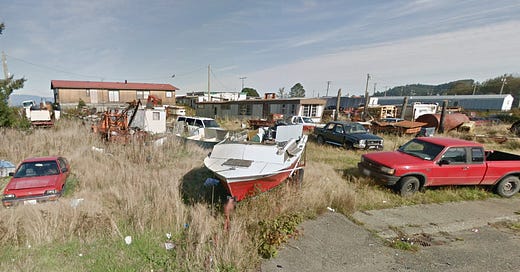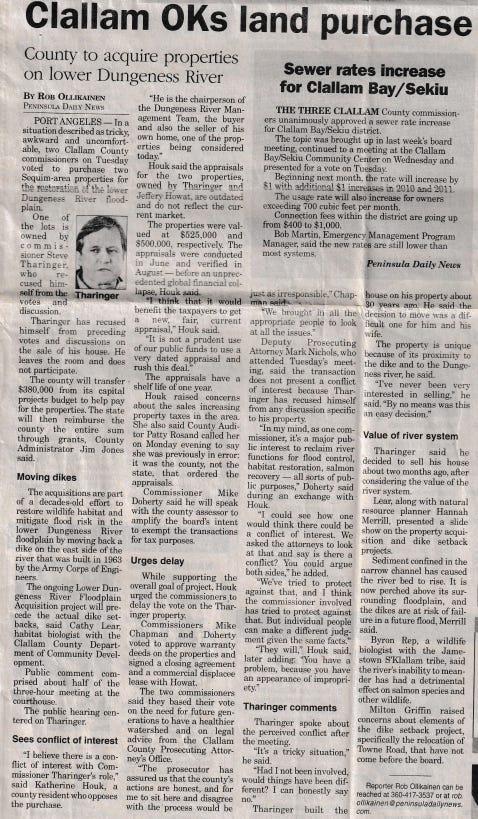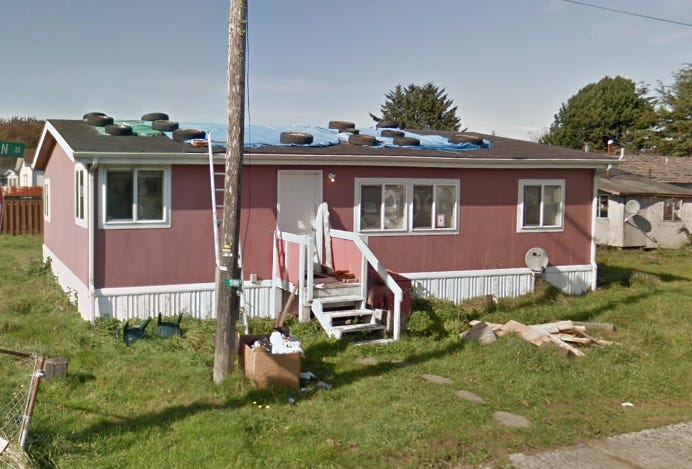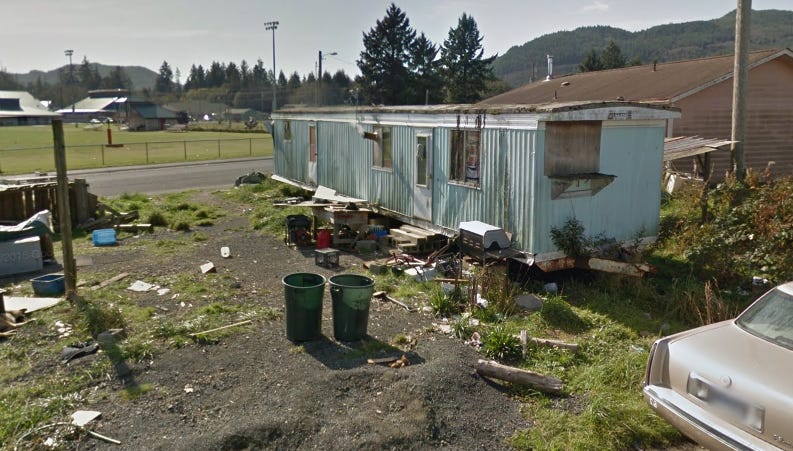Over a decade ago, crews lifted power lines over the pitch of a roof and slowly coaxed a building past the Dungeness Schoolhouse. Teetering on wheels and lifts, the home inched eastward to a new location less than a mile away. The house had to be relocated to make way for a new project that promised to remove a dike and restore salmon habitat to the Dungeness River.
Seeing a two-story house creep down the street was a rarity, but that wasn’t the only part of the arrangement that raised eyebrows in the community. Months earlier, in a March 4, 2009, Peninsula Daily News article, Dungeness resident Katherine Houk explained that the house and land had been appraised at $525,000 in 2008 before an unprecedented global financial collapse had lowered its value. However, the purchaser, Clallam County, still bought it for top dollar. “I think it would benefit the taxpayers to get a new, fair, current appraisal,” Houk had said.
It also concerned Houk that the seller was Dungeness resident Steve Tharinger, and the buyer was Clallam County, represented by County Commissioner Steve Tharinger. The Dungeness River Management Team (DRMT) advocated for the transaction. The DRMT began as a partnership between Clallam County and the Jamestown Tribe, and the organization’s chairperson was Steve Tharinger.
The Sequim Gazette reported that Tharinger didn’t want to sell and that “he’d rather keep the house and shop that he owns at 2747 Towne Road in Dungeness with his wife, Yvonne Yakota.” The article said that Tharinger, in a sense, was a victim of the salmon habitat restoration effort he so long championed as a county commissioner, a member of the Dungeness River Management Team, and a member of the state Salmon Recovery Funding Board.
During the commissioners’ vote on whether to approve or deny the purchase of the Tharinger-Yakota home, Tharinger recused himself and left the boardroom. Commissioners Mike Chapman and Mike Doherty approved the purchase, citing “the need for future generations to have a healthier watershed.”
With that, the first phase of the Lower Dungeness Floodplain Restoration project had begun. It would become a venture that catered to special interests, drained the county of taxpayer funds, and unexpectedly severed the most direct route between Dungeness and Sequim.
A year after selling his home to the County, Tharinger successfully ran for Washington’s 24th Legislative District — an area that encompasses all of Clallam and Jefferson Counties and parts of Grays Harbor County. Despite his rise in politics, Tharinger remained loyal to his Clallam County Commissioner District #1 roots and the small sovereign nation of the Jamestown Tribe within it.
Poverty Cove
Peeling paint, dogs roaming the streets, and tarps on leaky roofs anchored by rubber tires — it’s a portrait of hardship and underdevelopment.
First, one is shocked at how people in our country still live in these conditions. The shock turns to sadness when one wonders why people in America live like this. Then, there’s the guilt of knowing that just 90 minutes east, county residents live in first-world conditions, oblivious to their neighbors' despair.
In the 1800s, American traders called it “Poverty Cove,” but now it’s called Neah Bay on the Makah Indian Reservation.
Today, about 1,500 Makah tribal members live on the reservation, perched on the most northwestern point of the contiguous United States. According to 2020 census data, there aren’t huge disparities between Makah residents and the rest of the county — the poverty rate is slightly higher, and the median income is slightly lower.
The highway to Neah Bay skirts the coast and is peppered with potholes and uneven, buckling pavement as it winds past graffitied buildings and abandoned cars. Two hours after leaving Port Angeles, it’s clear that the county and nation have abandoned the Makah Indian Reservation and its people.
And so has the state.
State spending
Washington State’s capital budget (different from the operating and transportation budgets) is dedicated to acquiring and maintaining state buildings, public schools, higher education facilities, public lands, parks, and other assets. This budgeting process begins every fall when various agencies submit their requests. Most money comes from state taxes, such as sales, property, and business and operations taxes.
In other words, it comes from you.
The Capital Budget Committee, which comprises fiscal leaders representing the state’s House and Senate, develops the capital budget. They negotiate a final budget behind closed doors and submit it to the full legislature for a vote. This year, the capital budget committee presented the budget on March 6th, and the Senate and House passed it on March 7th.
The legislature had a single day to review the 184-page capital budget and the 894-page accompanying operating budget, which was also presented on March 6th and passed a day later.
Once the legislature passes the capital budget, it goes to the Governor for signature.
The budget runs in two-year cycles and is commonly revised annually through a supplemental budget. We are currently in the 2023-2025 cycle. During this cycle, the following jurisdictions received state capital funds:
The Makah Tribe was awarded $160,000 for a community gymnasium.
Their neighbors, the Quileute Tribe, were awarded $78,000 to modernize their tribal school district.
The Elwha Tribe, west of Port Angeles, received nothing.
Clallam County was awarded $5,750,000 to construct a joint public safety facility in Port Angeles.
The Jamestown Tribe received $28,000,000 for behavioral health community capacity grants.
The award amounts can also be viewed on a per capita basis:
Approximately 1,500 Makah members live on the reservation, representing a $106 per capita allotment for the community gym.
The Quileute members, where 352 people live, receive $221 per capita from the capital budget.
Be it the 985 total Elwha members or the 395 living on the reservation, they receive nothing.
Clallam County’s 77,160 residents get $75 per capita.
The 217 Jamestown members who live locally each receive $129,032 per capita.
A review of the capital budget cycles going back a decade reveals the same pattern: a smattering of funds are occasionally awarded to tribes living west of Port Angeles, and Clallam County gets a modest amount, too. Year after year, the Jamestown Tribe, the group with the fewest residents living in Clallam County, rakes in millions for land acquisitions and construction projects.
Power brokers
The House Capital Budget Committee could be the state’s most powerful group of people — it’s them, not the governor, who divvies up and assigns your tax dollars to different agencies and sovereign nations. They, not the legislature, spend weeks behind closed doors deciding who gets what before emerging with a thousand pages to be reviewed in one day.
The committee is guided by its chair, a man who befriended a Tribe and sat on two boards that decided his home and land should be bought for a premium price.
The Capital Budget Committee is chaired by one of two State Representatives to the 24th Legislative District: former Clallam County Commissioner Steve Tharinger.
Voters’ guides arrived via USPS yesterday, and ballots will be mailed out on October 16th. Remember to vote by Tuesday, November 5th.
Correction: Wednesday’s article, “New ‘parcel fee’ to be investigated,” erroneously stated that the conservation district had accrued $16,000 in legal fees due to a lawsuit. An election decertification action (not a lawsuit) has been filed against the conservation commission (the statewide agency, not the local district), which has accrued legal costs of $16,000. The story has been corrected online.










Another very informative piece. Thank you, again, Jeff.
This vast and seemingly unlimited favoritism to the Sequim area tribe simply needs to stop. They are clearly acquiring money that there are higher needs for. I've been to both mentioned western tribal lands and was saddened by the obvious despair. Improving their living conditions should be a priority for the county commisioners and state politicians representing this county.
The Tharinger involvement is disturbing. It appears he set the trend of funneling grossly excessive amounts of tax payer money to Ron Allen's empire. Time for him to leave politics as he should not have the faith of the voters to continue.
Wow! I think you have proven multiple times now that some local politicians are bought and paid for. Great article. You might be one of the only true journalists left. JSKT chairman is a master politician and operates with impunity and in the shadows. Movie type stuff.